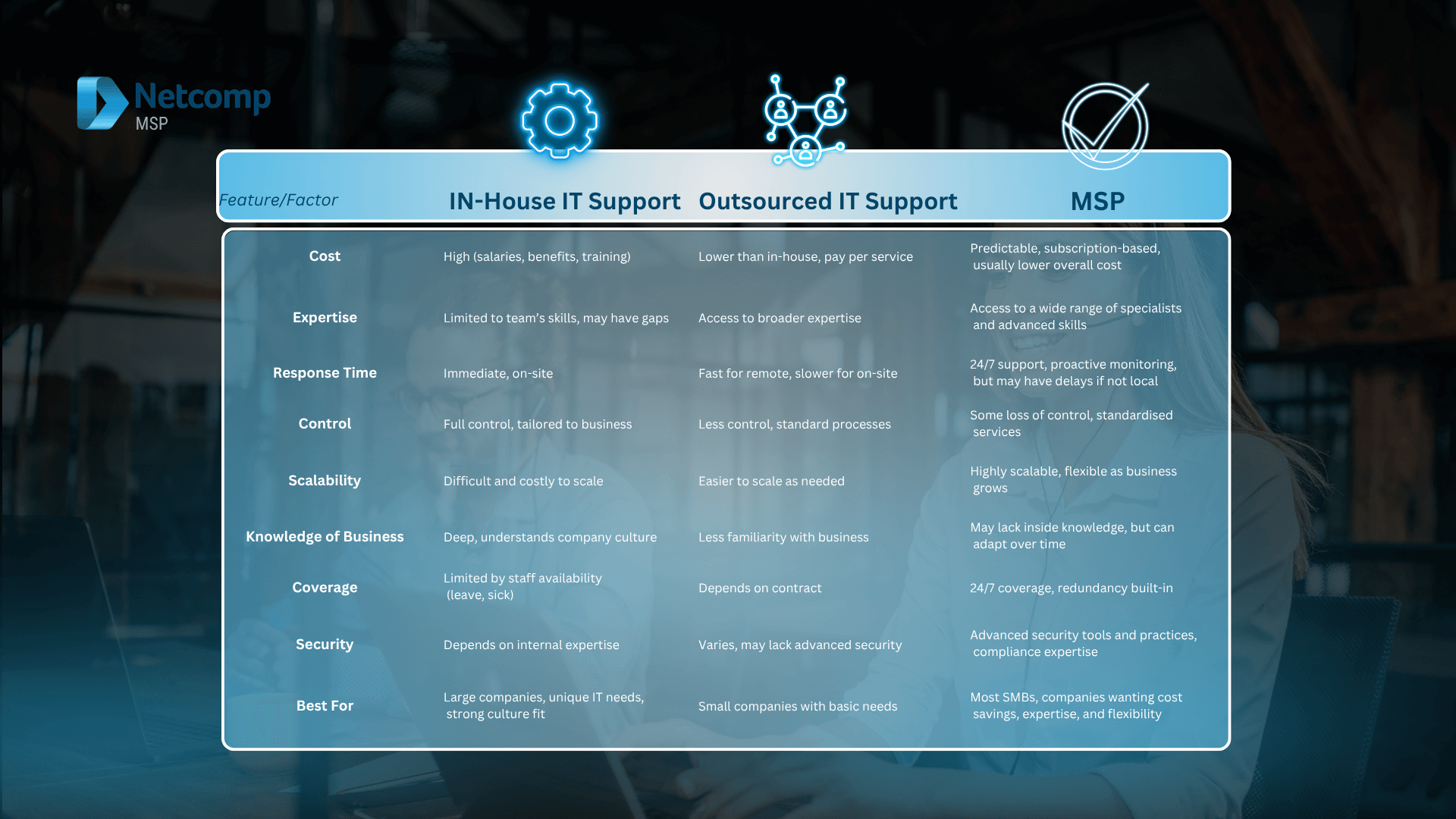Is your small business constantly battling tech headaches? Perhaps you’re grappling with persistent software glitches, or feeling vulnerable to the ever-present threat of cyberattacks. Indeed, IT issues can relentlessly derail productivity and growth for businesses of all sizes, especially here in Australia. Managing information technology in-house often becomes a significant burden for smaller enterprises. This is primarily due to the inherent complexity of modern IT systems and the escalating costs associated with maintaining them. Crucially, finding and retaining specialised expertise within a tight budget is a major challenge. Consequently, many Australian businesses find themselves stretched thin, struggling to keep pace with technological advancements while focusing on their core operations.
However, there’s a strategic and effective alternative: outsourced IT support, particularly through a model known as Managed IT Services. This approach allows businesses to leverage external expertise, ensuring their technology runs smoothly and securely without the overheads of an internal IT department. Furthermore, the Australian IT outsourcing market is experiencing significant growth. It’s projected to reach a substantial US$15.39 billion in 2025, with an anticipated annual growth rate of 8.42% (CAGR 2025-2029), resulting in a market volume of US$21.26 billion by 2029 (Source: Statista ). This booming market clearly signals a growing reliance and trust in external IT partnerships.

What You’ll Learn
Ultimately, this article will explore the myriad benefits of outsourcing IT support, specifically tailored for Australian small businesses.We’ll answer key questions like:
- What is outsourced IT support?
- Why do companies outsource their IT?
- What are the core benefits?
- How much does it cost?
- What are the most commonly outsourced IT services?
What is Outsourced IT Support?
When we talk about managing technology, Australian businesses have a few key paths to consider. It’s important to understand the distinctions, as each offers a different level of partnership and responsibility.
Defining Outsourced IT Support
At its core, outsourced IT support simply means contracting a third-party provider to handle specific IT tasks or functions. Think of it as bringing in a specialist for a particular job. For instance, you might hire someone to fix a specific network issue, provide occasional help desk assistance, or manage a single software application. This approach is often reactive. In other words, you call them when something breaks or when you need a specific, defined task completed.
The More Holistic Approach: Managed IT Services
While simple outsourcing is about specific tasks, Managed IT Services represent a far more holistic, proactive, and long-term partnership. In this model, a third-party provider takes full responsibility for managing and maintaining your business’s entire IT infrastructure and systems. They essentially become your dedicated IT department, working continuously to prevent problems before they even arise. Therefore, they truly function as an extension of your in-house team, deeply integrated into your operational flow.
How These Models Work in Practice
The typical model for both outsourced and managed IT involves a strategic partnership. Your chosen provider manages your IT infrastructure, offers ongoing support for your staff, and crucially, provides proactive maintenance to keep everything running smoothly. This means they’re not merely fixing things when they break. Instead, they’re actively monitoring your systems, applying critical updates, and identifying potential issues before they cause disruption. Consequently, your business experiences greater stability and fewer unexpected tech emergencies.
In-House vs. Outsourced vs. Managed: A Clearer Picture

To truly understand which approach might suit your Australian small business best, let’s look at the core differences:
In-House IT:
- Cost: Primarily involves high, fixed costs like salaries, superannuation, and benefits for your own IT staff.
- Expertise: Limited to the skills of your few internal employees, potentially lacking broad specialisation across all IT domains.
- Approach: Often reactive, focusing on fixing problems as they occur, due to being stretched thin.
- Control: Offers direct control over your IT team and operations.
Outsourced IT Support (Task-Based):
- Cost: Variable costs, paid per task or project, which can be unpredictable if issues are frequent.
- Expertise: Access to specific expertise for defined problems or projects, but not necessarily ongoing.
- Approach: Predominantly reactive; you engage them when a specific need arises.
- Control: Less direct control over ongoing strategy; more transactional.
Managed IT Services (Holistic & Proactive):
- Cost: Predictable, fixed monthly costs, converting IT expenditure into a manageable operational expense.
- Expertise: Access to a diverse team of certified IT specialists across all crucial areas (cybersecurity, cloud, networks, etc.) at a fraction of the cost of hiring internally.
- Approach: Fundamentally proactive; systems are monitored 24/7, and issues are prevented before they impact your business.
- Control: You retain strategic oversight, while the provider handles the operational burden.
Why Do Australian Businesses Choose to Outsource Their IT Support?
Even without committing to a full Managed IT Services model, there are compelling reasons why an Australian business might choose to outsource specific IT tasks or support needs. This approach is often driven by immediate requirements or a desire to solve particular problems without a long-term internal commitment.
1. Targeted Cost Savings
Firstly, opting for task-based outsourced IT support can offer targeted cost savings. Instead of hiring a full-time specialist for a rare or intermittent IT need, you can simply pay for the specific service when it arises. This means avoiding the significant fixed costs associated with a permanent employee, such as salaries, superannuation, benefits, and ongoing training. Ultimately, it allows you to manage expenses on a per-project or per-incident basis, rather than carrying the overhead of an in-house expert you might not constantly utilise.
2. Access to Specific Expertise
Secondly, small businesses often encounter IT challenges that require highly specialised skills their internal team might lack. Outsourcing a specific task provides immediate access to niche expertise for that particular problem. For instance, if you need help with a complex network configuration, a tricky software integration, or a one-off data migration, you can bring in a specialist exactly when you need them. This ensures the job gets done correctly and efficiently. Also without having to invest in training your own staff or making a permanent hire for a temporary need.
3. Focus on Core Business Functions
Thirdly, by offloading specific IT distractions, your internal staff can truly concentrate on their core business functions. If a particular system glitch or a new software rollout is consuming valuable time, outsourcing that specific task frees up your employees. This allows them to remain focused on revenue-generating activities and the everyday operations that drive your business forward. As a result it prevents IT issues from derailing their productivity.
4. Project-Based Scalability and Flexibility
Furthermore, for businesses with fluctuating project loads or infrequent IT needs, outsourced IT offers valuable project-based scalability and flexibility. You can easily engage experts for short-term projects or urgent fixes without the complexities of hiring or redundancies. This means you only acquire the IT support you need, precisely when you need it, adapting quickly to demands. For example for website launch, a temporary system upgrade, or recovering from an unexpected issue.
5. Addressing Specific Security Gaps

While not a full cybersecurity solution, task-based outsourcing can help address specific security gaps. You might hire an external expert for a one-time security audit, to implement a new firewall, or to help recover from a specific cyber incident. This provides a focused injection of security expertise to handle critical, defined threats or vulnerabilities when they arise. Rather than managing your entire security posture internally.
6. On-Demand Availability for Urgent Issues
Finally, when a critical IT problem strikes outside of normal business hours, or if your small internal team is overwhelmed, task-based outsourced IT can provide on-demand availability for urgent issues. You can call upon an external technician to address critical breakdowns or perform necessary system updates. Moreover, you could get help at times convenient for your business.
What Are the Key Benefits of Task-Based IT Outsourcing for Your Business?
Moving beyond what outsourced IT support is, let’s explore the benefits your business can gain. This isn’t about replacing your entire IT function, but rather about smartly addressing particular needs or gaps.
1. Realising Significant Cost Efficiency
Firstly, by choosing task-based IT outsourcing, you can achieve significant cost efficiency for specific IT needs. You directly avoid the overheads associated with an in-house IT department for specialised skills you might not constantly require. For instance, rather than paying a full-time salary (including super and benefits) for an expert to perform a one-off server migration, you simply pay for that specific service when it’s needed. Therefore, this helps in reducing your overall operational costs by turning potential fixed employee expenses into variable, project-specific outlays.
2. Swift Problem Resolution & Access to Specialised Skills
Secondly, when a specific IT problem arises, accessing specialised professionals means faster problem resolution. You can quickly bring in an expert who possesses precisely the knowledge needed to diagnose and fix a particular issue. This provides access to a broad skillset across various IT domains. Also it enables you to tap into expertise for complex networking challenges, specific software malfunctions, or critical hardware repairs. In other words, tasks that your internal team might not handle regularly. Consequently, your business benefits from targeted technical assistance when it’s most needed.
3. Enhancing Employee Efficiency and Productivity
Thirdly, by entrusting specific IT tasks to external specialists, your internal staff can truly enhance their efficiency and productivity. So they can remain focused on their core business activities. This directly impacts your profitability, as employees can concentrate on what they do best, contributing to overall business growth.
4. Project-Specific Flexibility and Scalability
Moreover, for businesses that encounter fluctuating IT demands, task-based outsourcing offers considerable project-specific flexibility. It also provides scalability for distinct projects. You can easily engage or disengage IT professionals based on the scope and timeline of your individual projects. There’s no need to worry about hiring or redundancies. Instead, you simply scale your support up or down to match immediate project needs. For example, setting up a new office branch or implementing a unique software rollout.
5. Addressing Specific Security Concerns
Furthermore, while not providing continuous, comprehensive security, task-based outsourcing can be invaluable for addressing specific security concerns. You might engage an external expert to conduct a one-time security audit, set up a new firewall. Or assist with a critical data recovery after an incident. This allows you to leverage advanced threat protection and expertise for particular vulnerabilities. Also it helps to ensure compliance for a specific system or project, reducing immediate risks.
6. Support for Business Continuity (Post-Incident)
Finally, in the unfortunate event of hardware failure, or other issue, outsourced IT can provide critical support for business continuity. While it may not prevent the event, it can offer expert assistance for incident response and data recovery solutions. As a result it helps to restore data integrity and facilitate a swift resumption of operations after disruption. This ensures you have specialised help available to get back on track.

How Much Does Outsourced IT Cost in Australia?
Understanding the cost of IT support is naturally a top concern for any Australian small business. When it comes to task-based outsourced IT support, it’s crucial to understand that there isn’t a single “average cost.” Instead, expenses vary significantly depending on the specific service you need, the complexity of your IT infrastructure, and the urgency of the task at hand.
Common Pricing Models for Task-Based Support
For individual IT tasks or projects, you’ll typically encounter these pricing structures:
- Hourly Rates (Most Common): Primarily, ad-hoc or project-based support is charged by the hour. In Australia, you can generally expect hourly rates for IT support specialists to range from around $150 to $250 per hour. However, this can fluctuate based on the technician’s specialisation and experience, as well as whether the work is performed during or after business hours. Some providers might also offer a minimum charge for any site visit, typically around one hour.
- Per-Device Pricing (for Specific Hardware Tasks): Less commonly, some providers might quote a fixed price per device for a specific task. For example, a laptop setup or a printer configuration. This is generally for routine, well-defined hardware management needs.
- Minimum Engagement Fees: Many IT providers have minimum fees for call-outs or projects, even if the task is short. This ensures their time and travel are adequately covered.
Key Factors Influencing Your Costs
Several factors will directly impact the final price for your specific outsourced IT task:
- Complexity of the Task: A simple software installation will cost less than a complex network troubleshooting issue. Or a data recovery process after a system failure. In other words, the more specialised the skill required, the higher the rate.
- Urgency and After-Hours Support: If you require immediate emergency assistance or support outside standard business hours, expect higher hourly rates. Also some providers might have an “emergency response” surcharge.
- On-Site vs. Remote Support: Remote support (e.g., via phone or screen sharing) is often more cost-effective than an on-site visit, which may include travel time charges.
- Existing Infrastructure: The age and complexity of your current IT setup can influence the time and expertise required to resolve an issue. Thus affecting the cost. Older systems might demand more specialised attention.
- Response Time Agreements: While full Service Level Agreements (SLAs) with uptime guarantees are usually for managed services, you might negotiate specific response times for urgent task-based support, which could influence the pricing.
The Value Beyond the Invoice
Ultimately, while the cost is a key consideration, viewing task-based outsourced IT support as a strategic investment is vital. Rather than solely an expense, it delivers significant value by rapidly resolving critical issues. By bringing in a specialist when needed, you avoid the much larger hidden costs of prolonged internal troubleshooting.
Therefore, we recommend that Australian businesses get tailored quotes from reputable providers based on their specific needs. It’s always wise to conduct a thorough cost-benefit analysis, considering the true value of rapid, expert intervention.
Conclusion
In summary, the landscape of IT management offers Australian small businesses more flexibility than ever before. We’ve explored how opting for task-based outsourced IT support can be a strategic decision, precisely addressing your specific technological needs without the extensive commitments of a full in-house department. Ultimately, this approach empowers your business by providing immediate access to specialised expertise, allowing for swift problem resolution when critical issues arise.
If you have any questions or need professional advice tailored to your business IT needs, Netcomp is here to help. Our team of experts can guide you through the complexities of IT support and help you make informed decisions for your business’s future.



